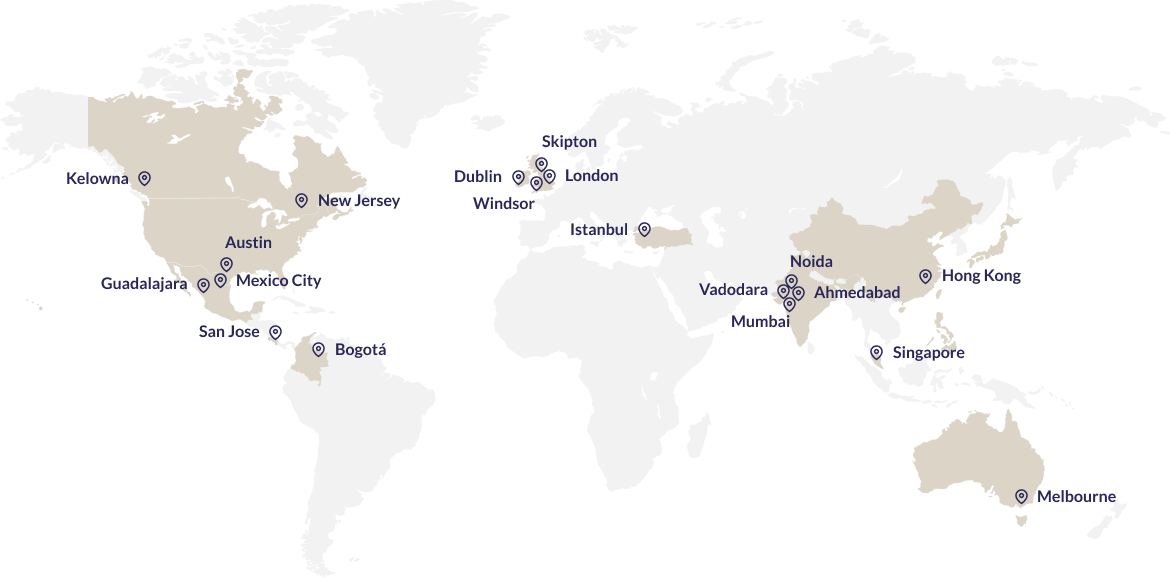

Recruitment Outsourcing Services That Power Growth
24/7 support, tailored solutions, and 60% cost savings to meet peak hiring demands effortlessly.

Scale and transform your business with intelligent outsourced recruiting services
Your Trusted Partner for Recruitment Outsourcing Services
For over 20 years, we’ve empowered staffing businesses to achieve 48% YOY growth and cut operational costs by up to 60% with customized recruitment solutions that adapt to your needs.
- Tailored support for your outsourcing recruitment needs, designed to scale effortlessly.
- Seamless integration of technology and expertise for faster, more efficient hiring.
- Guaranteed compliance with EEOC, OFCCP, SOC2, and other regulations.

Scaling staffing businesses for 20+ years

Transforming businesses by offering end-to-end recruitment solutions

Integrating technology with industry expertise to ease the hiring process

Ensuring EEOC, OFCCP, SOC2, and other compliance regulations
10X
ROI
48%
Yearly Growth
100%
Audit Score
95%
Avg. Compliance Maintained

Services
Full Cycle Recruitment
Managing recruitment end-to-end is time-consuming and resource intensive. We take the load off by delivering a seamless process—from understanding job requirements to onboarding the perfect candidate. Free up your team’s time to focus on client success and growth while we handle it all.
Learn MoreMSP + VMS Recruitment Support
Under constant pressure to meet KPIs and deliver results faster? We specialize in optimizing MSP and VMS recruitment workflows, ensuring faster submissions and maximizing ROI. Partner with us to turn hiring speed and quality into your competitive edge.
Learn MoreSourcing & Screening
Finding qualified candidates shouldn’t hold your business back. We source and screen candidates for permanent, temporary, and contract roles, ensuring quality and speed. Whether it’s resume sourcing or executive search, we deliver talent that aligns with your goals.
Learn More
Compliance & Admin Support
Compliance and admin tasks shouldn’t drain your team’s energy. Let us handle 24/7 regulatory credentialing, compliance, and back-office operations, ensuring you stay compliant and focused on what truly drives growth—building stronger client relationships.
Learn MoreFinance and Accounting Services
From establishing and managing a robust payroll and billing process to meeting your overall finance & accounting needs, we deliver comprehensive, custom F&A services for agencies.
Learn MoreSimplify Staffing Operations with Outsourced Recruitment Support

Cost-Efficient Solutions
Cut costs by up to 40% with scalable and flexible recruitment outsourcing services that boost profitability.

Time-Saving Support
Focus on growing your business while we handle the heavy lifting in recruitment operations.

Access to Top Talent
Leverage a global team of 500+ dedicated sourcing specialists ready to deliver exceptional results.

Tailored to Your Needs
Scale and transform effortlessly with customized recruitment solutions that adapt to market demands.

Streamlined Processes
Achieve operational excellence with outsourcing recruitment needs that optimize workflows and improve outcomes.

Secure Infrastructure
Protect your data and maintain compliance with a robust, secure infrastructure you can trust.
Client Stories
Estuardo Guerra, Senior Director– Favorite HealthCare Staffing, USA
Estrado Guerra, the Senior Director of the Center of Excellence for Favorite HealthCare Staffing (FHS), highlights the benefits of partnering with QX. With QX’s 24/7 service, advanced automation technology, and customized scalable solutions, FHS has been able to efficiently manage their heavy workload during peak periods.
Nearshore & Offshore Recruitment Solutions
We are a global team of culturally diverse people who collaborate to drive our clients’ scalability, innovation, and success.

3000+
Global Workforce
6
Delivery Centers
150+
Enterprise Clients
550+
Recruitment Staff
Resources





FAQs
Recruitment outsourcing services involve delegating your hiring processes to a specialized external partner. This allows businesses to access skilled recruiters, advanced tools, and streamlined processes to efficiently find, screen, and onboard top talent.
Outsourced recruiting services handle your end-to-end recruitment needs or specific tasks like sourcing, screening, or compliance. By leveraging industry expertise and recruitment technology, they ensure timely and cost-effective talent acquisition tailored to your business goals.
Outsourced recruiting services help reduce hiring costs, enhance efficiency, and improve focus on core business operations. They also provide scalable solutions, ensuring your recruitment processes align with business growth and seasonal demands.
Recruitment outsourcing services improve hiring quality by accessing vast candidate networks, employing advanced screening tools, and leveraging industry-specific expertise. This ensures you secure the best-fit talent for your unique needs.
Outsourced recruiting services focus on hiring the right talent by aligning recruitment strategies with your company culture and retention goals. They also provide insights into improving onboarding and employee engagement to reduce turnover rates.
Getting started with our recruitment outsourcing services is simple: we begin with a consultation to understand your needs, followed by a tailored transition plan, onboarding of our team, and implementation of your recruitment strategy.
With over 20 years of recruitment outsourcing expertise, QX Global Group empowers staffing firms to optimize hiring through a client-first approach, global talent access, and advanced technology. Achieve up to 50% faster hiring and 30-40% cost savings with our tailored, compliant, and cost-effective solutions, allowing you to focus on core business operations while ensuring secure and efficient recruitment processes.




